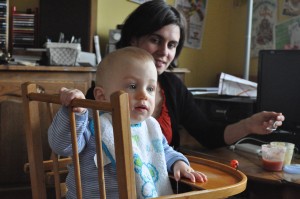Eatiology: How Parents Teach Kids to Like Food, or Not
 Yes, parents, what you do with your picky eater matters, but it’s not as hard as you might expect to get a child eating what you want her to eat.
Yes, parents, what you do with your picky eater matters, but it’s not as hard as you might expect to get a child eating what you want her to eat.
An old study, but a goodie, and one which uses the wonderful phrase “etiology of children’s food likes and dislikes,” (etiology meaning “the study of causes”) confirms that what foods children end up liking is determined largely by their experiences around food.
The study shows it’s not a matter of children being born liking or disliking certain foods. Rather they learn to like or dislike certain foods as they learn to associate them with happiness and enjoyment or misery and displeasure. And that has much less to do with the taste of the food than with their parents’ behavior and attitudes.
Whether the atmosphere at the table is pleasant or unpleasant, whether their parents are respectful or controlling with them with food, and how food is presented, that’s the main way kids decide what they like to eat or not. Also, if they puke or break out in itchy purple welts after eating something, that can influence their preferences. But we parents, while our genetics may be the cause, don’t have any say in those matters.
Food-Parent Pairings
The primary way to encourage your child to eat healthy foods, the study reveals, is to “pair” those foods “with positive interactions with a friendly adult.”
How simple is that? It’s kind of amazing, really. You don’t need to be any smarter than your child. And how much more enjoyable it can be than figuring out how to make your child eat by employing manipulative tactics like begging and bribes? What’s good for them is good for us, as I always say.
So we don’t need any tricky science or complicated psychological knowledge. We don’t need techniques. We don’t need seminars or books or experts or even blogs about picky eaters and how to cure them.
We just need to have regular meals where we chat amiably with our child. We beam on them with the sunshine of our love and acceptance. Our children need us to be nice and cheerful at the table, not pushy and controlling and worried. Children need to learn how to behave nicely and cheerfully at the table, too. It’s seemingly simple, yet requires some cultivation of skills and attitudes for both parties. Those details you may need to hear more about.
Then whatever we present to eat, they will likely see it in a favorable light and probably learn to like it. It’s a fabulous opportunity.
Unless it makes them puke and break out, then they won’t eat it. But that’s OK.
Hold the Line: Being Normal for Abnormal Eaters
This method of curing picky eating is just part of normal parenting. Are you maintaining normality in your parenting at the table? Or is your parenting becoming abnormal in response to your child’s abnormal eating? Is the atmosphere at your table normal or abnormal?
If the atmosphere at your dinner table is abnormal, that’s the first thing to change in the battle against abnormal eating. If you haven’t taken care of that, drop everything and focus on it. There’s no use doing anything else against picky eating until that’s improved. It may take some time and some change of thinking and behaving for the parent, but it may be enough to cure the problem. Even if it doesn’t cure the problem, it not likely to get worse, while your family’s peace and joy will improve, considerably.
What’s in? What’s Out?
Here are a few things to outlaw at your table; they create an unpleasant, abnormal atmosphere at the table, leading children to have a bad food experience. They create or worsen picky eating:
- Arguing, especially about food.
- Pressuring a child to eat, in any way, shape or form.
- Stressful, negative conversations in general.
- Children whining and complaining about the food (which they will have no reason to do if not forced to eat anything).
- Chaos and disorder.
- Carelessness in choosing, cooking and presenting meals.
- Rushing through meals.
Instead, good conversation:
- Talk about pleasant topics; save stressful topics for another time.
- Allow children to fill their own plates as much as possible and to decide how much of everything they eat (granted all the choices are good ones), as long as they are not piggishly keeping others from getting their share or otherwise being rude and unpleasant. No pressure to eat.
- Be cheerfully firm in teaching children that it’s offensive to complain about the food, but that cooks appreciate a compliment.
- Be lovingly firm in teaching them age-appropriate manners and polite conversation: please, thank you.
- Offer the healthiest, tastiest, most enticing dishes you can.
- Make time for family time at meals.
- Include children in the conversation.
- Tell stories from the day.
- Get to know your children and let them get to know you.
Have a question about how to make this happen? I have a lot of answers on this blog. Or send me a comment and I’ll answer you personally.
Related post:
How to Motivate the Picky Eater: In the pasture or in the woods?
***








[…] Eatiology: How Parents Teach Kids to Like Food, or Not […]